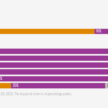
Political Reality of the National Debt
April 22nd, 2023
Hello this Saturday morning. Thanks for joining us.
Conversations about America’s debt crisis often end in confusion. Our national debt is approaching $32 trillion. The U.S. government will spend about $6.2 trillion this year. It seems simple: If we’re in debt, why do policymakers keep spending so much?
The irrationality of it all probably has something to do with the irrationality of public sentiment generally.
In March of this year, the Associated Press and University of Chicago polled Americans about their opinions on federal spending.
The result? Americans believe Congress spends too much – and they want Congress to spend more.
Sixty percent of U.S. adults think government spending is too high (just 16% think it’s too low).
But by massive four-to-one margins, U.S. adults also think government should spend more on education, health care, Social Security, and Medicare. Taken together, those four categories accounted for 57% of federal spending in 2022.

Something, obviously, has to give. Conventional wisdom holds that politicians must risk their careers to make the right policy choice on the national debt. The polling, after all, is brutal.
But conventional wisdom is often wrong.
***
Aside from a fringe minority, elected officials across the spectrum largely agree the national debt presents risk of fiscal calamity at some point, and the right policy choice would be to reduce the debt. It’s also clear that reducing the debt requires impacts to popular programs including Social Security, Medicare, Medicaid, and education.
It seems, then, that politicians have a pretty simple calculation: I can make the right policy choice, but polling shows it will jeopardize my career.
There’s ample evidence to support this. After passage of the Affordable Care Act in 2010, Republicans pilloried Democratic candidates over the bill’s transfer of $500 billion from Medicare. Some Democrats attributed their losses to the ads.
Similarly in 2011, after House Republicans passed a budget to reduce the debt with some Medicare reforms, Democrats ran ads showing various Republican candidates pushing a grandma in a wheelchair over the side of a cliff.
A brief case study shows how fraught debt reduction politics can be. But it also reveals cracks in the conventional wisdom. Like jumping into a cold lake, fear before the plunge may be worse than the plunge itself.
In the midst of that 2011 budget debate, a Democrat won a special election in a heavily Republican district in New York. She centered her campaign on opposing the entitlement reforms in the House budget. That Democrat is Kathy Hochul, who is now governor.
Hochul won in May 2011. The federal government was set to hit the debt ceiling on August 4.
In the intervening months, Speaker John Boehner and President Barack Obama came within a hair’s breadth of striking the “Grand Bargain” – spending cuts, tax increases, and entitlement reforms. Obama and Boehner held personal talks, some secret, which famously included a golf summit. They got so close that the Speaker’s office began drafting bill language.
But the deal fell apart on July 22, 2011, with each side accusing the other of backing out. Tax increases and some intransigence from Republican hardliners surely played a role in the collapse, but Hochul’s win just weeks earlier in a campaign centered on protecting entitlements also terrified sitting members.
The lessons? Entitlement reform is called the “third rail” for good reason. But a divided federal government came that close to getting it done in 2011.
Under the right conditions, policymakers can eschew the conventional wisdom and pursue the right policy choice. It just requires guts and leadership.
And North Carolina’s experience since 2011 shows the conventional wisdom may not even be true. Legislative Republicans have been under fire for more than a decade for restrained spending. Their continued political success shows saying “no” may not be the political loser so many people fear.
***
Most people under 45 years old don’t expect Social Security and Medicare to be available to them. They’re pessimistic policymakers can get their act together.
Conventional wisdom says their pessimism is well-placed. Despite their reputation, politicians have made bold choices many times throughout history.
Don’t count them out just yet.
Recent Articles
When Prayers are Heard, Answers Come: Finding Peace in Times of Crisis
From the Desk of Chuck Fuller “Our prayers, sir, were heard, and they were graciously answered” Many years ago, I led a task force responding to a series of tornados that devastated parts of eastern North Carolina. In our early discussions, we debated how many people needed to be impacted for us to implement a…
Read MorePassenger rail’s future in North Carolina
Thank you for joining us this Saturday morning. America once led the world in train travel. Routes spanned the continent and most people had easy access to a train station. But trains gave way to cars and planes, and by the 1960s privately owned train companies were bleeding revenue. In 1970, Congress passed and President Richard Nixon…
Read MoreThe Golden LEAF Foundation and North Carolina
Thank you for joining us this Saturday morning. Today we’re diving into one of the most impactful North Carolina organizations of the past 25 years: Goldean LEAF (“LEAF” stands for long-term economic advancement foundation)The nonprofit has largely flown under the radar for the past decade. That lack of public attention or controversy should be seen…
Read More
